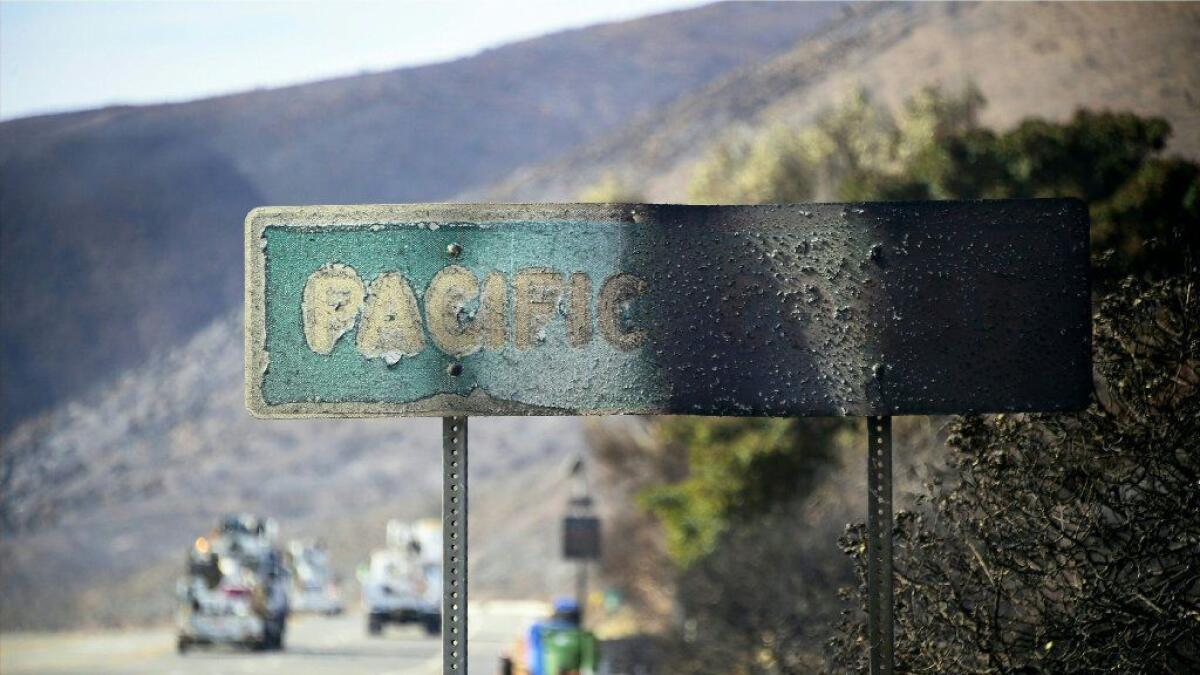Newsletter: Mike Davis and the case for letting Malibu burn

Good morning. I’m Paul Thornton, and it is Saturday, Nov. 17, 2018. Let’s take a look back at the week in Opinion.
Any proud Angeleno who circulates among West Coast skeptics is familiar with the type who has read historian Mike Davis’ books and isn’t content just to point that L.A. has flaws, but must also insist that the entire metro area is an abomination deserving of rapid downsizing if not complete desertion. The trick is to have on hand some good “yeah, but” responses — acknowledging what Davis got right about Los Angeles, then pivoting to L.A.’s increasing self-awareness and attempts to mitigate our mistakes — and get back to chatting amicably at whatever outdoor dinner party you’re attending in November, because this isn’t New York, and it isn’t freezing outside.
But whenever there’s a fire threatening the homes built amid combustible brush and drying trees — an increasingly common occurrence — we’re reminded in the cruelest way possible that Davis was on to something when he expanded his Marxist critique of race relations in Los Angeles to the city’s sporadically dangerous and fickle physical setting. With many homes in Malibu and on the hills above it going up in flames right now, columnist Gustavo Arellano revisits the chapter of Davis’ 1998 book, “Ecology of Fear,” that advocated letting a place like Malibu burn when a fire strikes:
Mourning Malibu like a local: TV producer and writer Marc Weingarten recently moved out of the increasingly busy tourist hive, but he and his family still long for their old home. Now, with much of the city burned and neighbors left with nothing, Weingarten and his family received consolation knowing that his old house remained standing while those around it were not as fortunate. L.A. Times
What it was like in Butte County: A Cal State Chico professor who was teaching classes the day of Paradise’s destruction writes of instantly plummeting temperatures because of smoke blocking the sun’s rays, frantic efforts to assemble “go-go” bags, and futile efforts to get reliable information. She concludes: “Still, if events like the Camp Fire are part of what Gov. Jerry Brown has called ‘a new abnormal,’ the true test of our compassion and grit will be in the coming months and years when the fate of the most vulnerable — who we’ve always known would be most affected by climate change — will be largely in our hands, as a state and a nation.” New York Times
More on the fires: Now is not the time to bring up Mike Davis, says a former Malibu resident. An L.A. Times Opinion editor who had to evacuate her home wants people to think before they tweet about the fires. An editorial writer recalls the exciting Santa Ana winds and the kinder, gentler fires of his childhood. California is on fire, it will be again, so let’s get ready, says the editorial board.
It’s probably carbs that are preventing you from losing weight. Dr. David S. Ludwig’s hypothesis is that eating processed carbohydrates floods our body with insulin, leading all that glucose to be hoarded by fat cells rather than used in other systems, thereby stimulating hunger even when we’ve had plenty to eat. His recent study analyzing the calorie burn of 164 individuals who were put on strictly controlled diets seems to bolster his hypothesis, he writes. L.A. Times
Amazon doesn’t need taxpayer subsidies. Los Angeles did not “win” the race among cities to have Amazon build its second headquarters here and, in the process, raid our municipal coffers. “Why are financial incentives for Amazon even on the table?” asks the editorial board. “After all, Amazon had already decided to create the jobs; the only question was where it would put them.” L.A. Times
It’s ballot counting, not ballot-box stuffing. Californians ought to feel lucky to live in a state that makes every effort to turn out the vote, and tries even more methodically to tabulate each ballot that is legally cast. Suggesting fraud is behind the steady trickle of vote-total updates that happen to have benefited Democratic candidates is irresponsible, says the editorial board. L.A. Times
Reach me: paul.thornton@latimes.com
